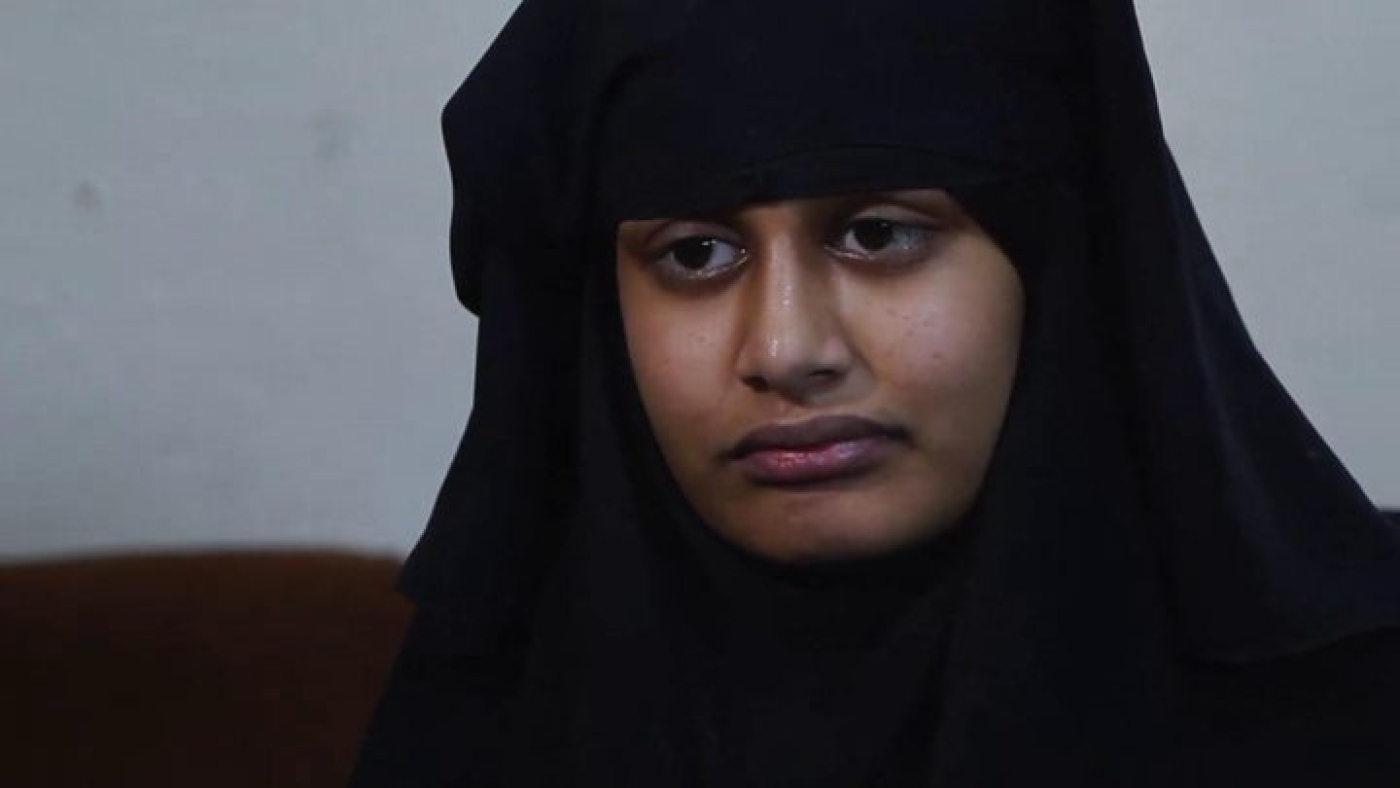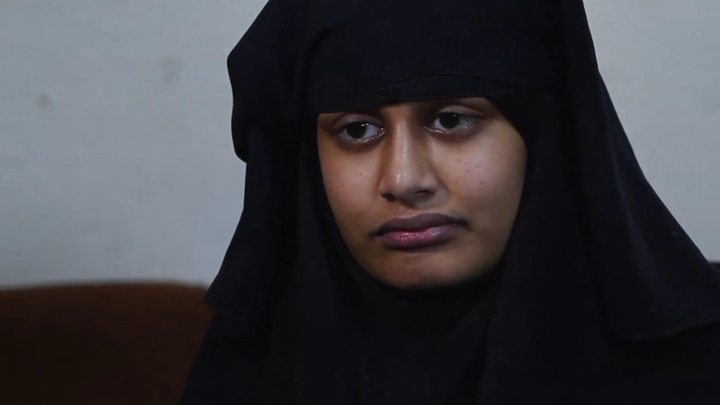Document cited during Shamima Begum's citizenship appeal reveals government explored options to repatriate detainees from camps in Syria


 www.middleeasteye.net
www.middleeasteye.net
Begum's British citizenship was revoked in February 2019 by former UK Home Secretary Sajid Javid (Screengrab)
By
Areeb Ullah
in
London
Published date: 25 October 2019 15:27 UTC | Last update: 32 min 59 sec ago
The British government considered the repatriation of nationals who travelled to Islamic State (IS) group-controlled territory and are now being held in camps by Kurdish forces in northern Syria, a court in London has heard.
The information emerged during an appeal being brought by Shamima Begum against the British government's decision to revoke her citizenship being heard at the Special Immigration Appeals Commission in London.
On Friday, Begum's lawyer, Tom Hickman, referred to a government document stating that it had explored options for the potential repatriation of British citizens suspected of aligning themselves with IS.
"There was a foreseeable chance of her being repatriated to the UK because that’s stated in terms," Hickman said the government document noted on Friday.
He then went on to quote the government document which stated: “Although speculative, it is possible that at some point in the future British nationals will be treated differently.”
"We don't accept that it was merely speculation. It is possible she would have been taken back to the UK," said Hickman.
The court later moved into a closed session, meaning that journalists, members of the public and even Begum's legal team were excluded from proceedings.
The revelation departs from previous government statements on the repatriation of British nationals detained in Kurdish-run camps across northern Syria.
Speaking to the Times newspaper on Wednesday, Begum, who absconded to Syria from London aged 15 in 2016, said she feared being attacked by female IS militants inside the al-Roj refugee camp.
She raised concerns that a hearing against her citizenship revocation would have no impact on her current circumstances.
“My case is no different to that of the other British women here, many of whom have not had their citizenship removed,” she said.
“Their cases have not moved forward, though they still have British citizenship, so I can’t see mine changing quickly.”
'No way' of Begum returning
Last month, UK Home Secretary Priti Patel said that there was "no way" that Begum could return to the UK.
In previous statements, former ministers have shied away from committing to repatriating children or others on the grounds that it is considered too dangerous for officials to attempt a rescue.
Begum was stripped of her British citizenship by then-Home Secretary Sajid Javid in February 2019 shortly after giving an interview to the Times in the camp where she was being held.
She is among dozens of British nationals who have travelled to Syria who have been stripped of citizenship by the government amid fears about the potential security threat posed by returnees to the UK.
It is understood that Javid made the decision on the advice that Begum could qualify for Bangladeshi citizenship due to the fact that her parents hold Bangladeshi citizenship.
Court papers noted that Patel supported her predecessor's decision to strip Begum of her citizenship on grounds that she was "aligned" to IS.
This new development also comes as the UK government faces mounting pressure to repatriate children of suspected IS members stranded in northern Syria who hold British citizenship or are entitled to it.
The government said it was exploring options to bring back orphans and unaccompanied children stranded in northern Syria, stating that it was working with "partners on the ground".
No indication, however, was given on the timeline for these repatriations or whether the government would consider taking in children whose carers are still with them in northern Syria.


UK considered bringing home Islamic State-linked nationals, court hears
Document cited during Shamima Begum's citizenship appeal reveals government explored options to repatriate detainees from camps in Syria
 www.middleeasteye.net
www.middleeasteye.net
Begum's British citizenship was revoked in February 2019 by former UK Home Secretary Sajid Javid (Screengrab)
By
Areeb Ullah
in
London
Published date: 25 October 2019 15:27 UTC | Last update: 32 min 59 sec ago
The British government considered the repatriation of nationals who travelled to Islamic State (IS) group-controlled territory and are now being held in camps by Kurdish forces in northern Syria, a court in London has heard.
The information emerged during an appeal being brought by Shamima Begum against the British government's decision to revoke her citizenship being heard at the Special Immigration Appeals Commission in London.
On Friday, Begum's lawyer, Tom Hickman, referred to a government document stating that it had explored options for the potential repatriation of British citizens suspected of aligning themselves with IS.
"There was a foreseeable chance of her being repatriated to the UK because that’s stated in terms," Hickman said the government document noted on Friday.
He then went on to quote the government document which stated: “Although speculative, it is possible that at some point in the future British nationals will be treated differently.”
"We don't accept that it was merely speculation. It is possible she would have been taken back to the UK," said Hickman.
The court later moved into a closed session, meaning that journalists, members of the public and even Begum's legal team were excluded from proceedings.
The revelation departs from previous government statements on the repatriation of British nationals detained in Kurdish-run camps across northern Syria.
Speaking to the Times newspaper on Wednesday, Begum, who absconded to Syria from London aged 15 in 2016, said she feared being attacked by female IS militants inside the al-Roj refugee camp.
She raised concerns that a hearing against her citizenship revocation would have no impact on her current circumstances.
“My case is no different to that of the other British women here, many of whom have not had their citizenship removed,” she said.
“Their cases have not moved forward, though they still have British citizenship, so I can’t see mine changing quickly.”
'No way' of Begum returning
Last month, UK Home Secretary Priti Patel said that there was "no way" that Begum could return to the UK.
In previous statements, former ministers have shied away from committing to repatriating children or others on the grounds that it is considered too dangerous for officials to attempt a rescue.
Begum was stripped of her British citizenship by then-Home Secretary Sajid Javid in February 2019 shortly after giving an interview to the Times in the camp where she was being held.
She is among dozens of British nationals who have travelled to Syria who have been stripped of citizenship by the government amid fears about the potential security threat posed by returnees to the UK.
It is understood that Javid made the decision on the advice that Begum could qualify for Bangladeshi citizenship due to the fact that her parents hold Bangladeshi citizenship.
Court papers noted that Patel supported her predecessor's decision to strip Begum of her citizenship on grounds that she was "aligned" to IS.
This new development also comes as the UK government faces mounting pressure to repatriate children of suspected IS members stranded in northern Syria who hold British citizenship or are entitled to it.
The government said it was exploring options to bring back orphans and unaccompanied children stranded in northern Syria, stating that it was working with "partners on the ground".
No indication, however, was given on the timeline for these repatriations or whether the government would consider taking in children whose carers are still with them in northern Syria.

